Plastic-free Philly
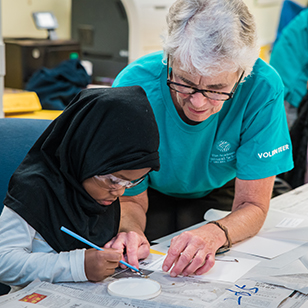
Learn
Find some simple ways to be plastic free.
Learn more
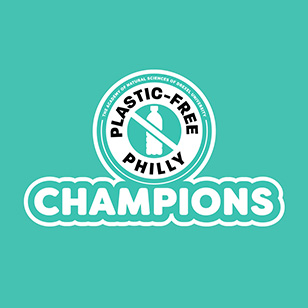
Teachers Education Package
A new educational package for 3rd to 8th grade teachers and educators in the region.
Learn more.
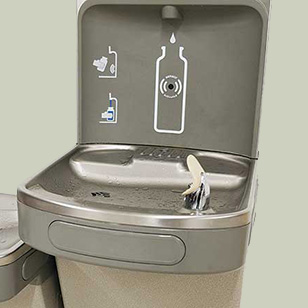
Sustainable Tips for Businesses
Tips to help your businesses become more sustainable.
Learn more.
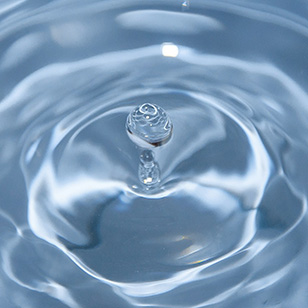
Fast Facts
Plastics made up 56% of trash removed from the Delaware and Schuylkill Rivers in one year.
Learn more.
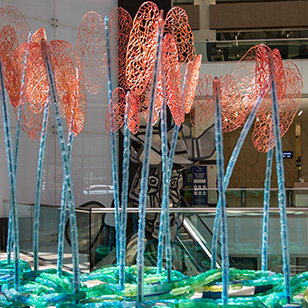
Meet the Artists
Explore the art of the 2022 Plastic-free Philly kick off.
Learn more
Plastic-free Philly, Philly’s solution to plastic pollution, is a volunteer effort aimed at reducing single-use plastic water bottles and replacing them with environmentally healthier options, such as drinking tap water and using refillable bottles. By eliminating plastic water bottles, you help keep our waterways clean and beautiful, preserving the health of our environment and our communities for future generations.
The Academy of Natural Sciences of Drexel University launched Plastic-free Philly in 2022 — our Water Year — to raise awareness of plastic pollution and clean water. The institution conducts actionable water science that seeks to illuminate the interactions between humans and the environment, especially in aquatic systems. The Academy is a science leader for the Delaware River Watershed Initiative, which protects and restores the rivers and streams that supply drinking water to 15 million people.
If you are a business owner, here are some tips to becoming a Plastic-free Philly company.
- Connect with your building’s property management team to see how you can work together to reduce plastic usage.
- Install hydration stations and water bottle fillers.
- Start a sustainability committee.
- Provide employee incentives for using refillable bottles, especially ones made of stainless steel or glass.
- Educate your employees on the effects of plastic in our waterways.
- Consider using a large cooler with iced tap water or boxed water for any event.
- Create a sustainable culture by providing mugs or glasses for tap water in the eating area.
Plastics, our Health and the Environment
Plastic litter is a common issue in Philadelphia. In one year, plastic waste made up 56% of the 44 tons of trash removed by the Philadelphia Water Department from a 32-mile stretch of the Schuylkill and Delaware rivers. These rivers, the two biggest rivers of the Delaware River watershed (which provides drinking water to over 15 million people), are the lifeblood of the greater Philadelphia region.
Plastic bottles in our waterways are harmful to people, as well as fish and animals that live in our waters. Plastic breaks down into extremely small pieces, which are often mistaken for food by wildlife. In addition to putting animals at risk for choking and suffocation, these microplastics pollute the earth, and their effects travel up through the food web, harming human health.
Plastic materials can attract heavy metals and other chemical contaminants (ex. PCBs and pesticides) from the surrounding environment. This property is especially harmful in the case of microplastics. These chemical compounds are absorbed by animals and humans that consume microplastics and can even bio-accumulate through the food chain.
2022 Plastic-free Philly Kickoff
Turning Discarded Plastic Bottles into Artworks
The Academy, in partnership with the Philadelphia Water Department and BOMA Philadelphia, kicked off Plastic-free Philly in 2022 with 10 original sculptural pieces by created mostly Philadelphia-area artists to raise awareness about the issue.
The temporary installations evoke the natural beauty of the Delaware River Watershed and examine how people’s habits positively and negatively impact the ecosystem.
The Artists and Installations
“Forest” by Kate Dodd of Orange, N.J., at 1500 Market Street
“Choking Hazard” by Kate Leibrand of the Philadelphia area, at 1515 Market Street
“That Sinking Feeling” by Aymar Ccopacatty of West Kingston, Rhode Island, at 1900 Market Street
“Fountain of Life” by Emilio Maldonado of Philadelphia, at One Commerce Square, 2005 Market Street
“Schuylkill Plastiglomerate” by Hannah Aya Alpert of Philadelphia, at The Bulletin Building, 3025 Market Street
“156 Handmade Clay Bottles” by Benjamin Peterson of Philadelphia, at Three Logan Square, 1717 Arch Street
“Plastic Waterfall” by Sarah Peoples of Philadelphia, at Cira Centre, 2929 Arch Street
“Waterline” by Silas McDonough of Philadelphia, at The Academy of Natural Sciences, 1900 Benjamin Franklin Parkway. Through Jan. 8
“Plastic Tides” by Christopher Hardgrove of Philadelphia, at FMC Tower, 2929 Walnut Street
“Schuylkill River Trash Quilt” by Ceilia Jailer, Eli Kleinsmith and Pierie Korostoff, all of Philadelphia, at MacAlister Hall, Drexel University, 3250 Chestnut Street. Through Sept. 30
Our Partners
The Academy convenes like-minded partners to provide actions, both big and small, that you can take to reduce plastic usage and keep our waterways clean. Special thanks to: